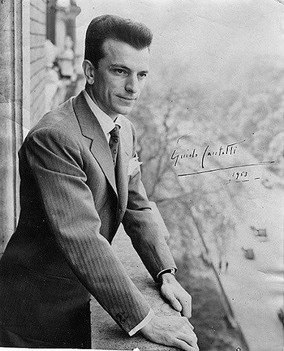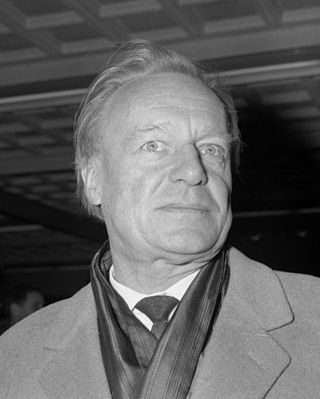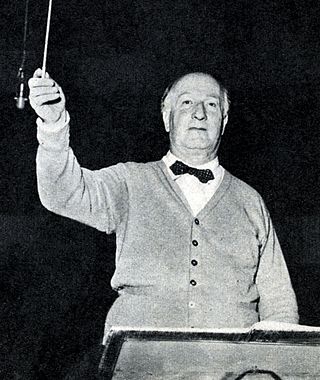Related Research Articles

Arrigo Boito was an Italian librettist, composer, poet and critic whose only completed opera was Mefistofele. Among the operas for which he wrote the libretti are Giuseppe Verdi's monumental last two operas Otello and Falstaff as well as Amilcare Ponchielli's La Gioconda.

Arturo Toscanini was an Italian conductor. He was one of the most acclaimed and influential musicians of the late 19th and early 20th century, renowned for his intensity, his perfectionism, his ear for orchestral detail and sonority, and his eidetic memory. He was at various times the music director of La Scala in Milan and the New York Philharmonic. Later in his career, he was appointed the first music director of the NBC Symphony Orchestra (1937–1954), and this led to his becoming a household name, especially in the United States, through his radio and television broadcasts and many recordings of the operatic and symphonic repertoire.

Riccardo Muti is an Italian conductor. He is current music director of the Orchestra Giovanile Luigi Cherubini. Muti has previously held posts at the Maggio Musicale in Florence, the Philharmonia Orchestra in London, the Philadelphia Orchestra, the Teatro alla Scala in Milan, the Salzburg Whitsun Festival, and the Chicago Symphony Orchestra. He was named Music Director Emeritus in Chicago in 2023.

Guido Cantelli was an Italian orchestral conductor. Toscanini elected him his "spiritual heir" since the beginnings of his career. He was named Music Director of La Scala, Milan in November 1956, but his promising career was cut short only one week later by his death at the age of 36 in the 1956 Paris DC-6 crash in France en route to the United States.

Sir Alan Charles MacLaurin Mackerras (; was an Australian conductor. He was an authority on the operas of Janáček and Mozart, and the comic operas of Gilbert and Sullivan. He was long associated with the English National Opera and Welsh National Opera and was the first Australian chief conductor of the Sydney Symphony Orchestra. He also specialized in Czech music as a whole, producing many recordings for the Czech label Supraphon.

Ezio Fortunato Pinza was an Italian opera singer. Pinza possessed a rich, smooth and sonorous voice, with a flexibility unusual for a bass. He spent 22 seasons at New York's Metropolitan Opera, appearing in more than 750 performances of 50 operas. At the San Francisco Opera, Pinza sang 26 roles during 20 seasons from 1927 to 1948. Pinza also sang to great acclaim at La Scala, Milan, and at the Royal Opera House, Covent Garden, London.
Wilfred Josephs was an English composer.
Edgar is an operatic dramma lirico in three acts by Giacomo Puccini to an Italian libretto by Ferdinando Fontana, freely based on the play in verse La Coupe et les lèvres by Alfred de Musset.

Alberto Fernando Riccardo Semprini, known as Alberto Semprini, or by his stage name Semprini, was an English pianist, composer and conductor, known for his appearances on the BBC, mainly on radio.

The Messa per Rossini is a Requiem Mass composed to commemorate the first anniversary of Gioachino Rossini's death. It was a collaboration among 13 Italian composers, initiated by Giuseppe Verdi. The composition was intended to be performed on 13 November 1869 in the Basilica of San Petronio, Bologna, where Rossini grew up and spent a large part of his life.
Sir Reginald Goodall was an English conductor and singing coach noted for his performances of the operas of Richard Wagner and for conducting the premieres of several operas by Benjamin Britten.

Sigurd is an opera in four acts and nine scenes by the French composer Ernest Reyer on a libretto by Camille du Locle and Alfred Blau. Like Wagner's Ring of the Nibelung, the story is based on the Nibelungenlied and the Eddas, with some crucial differences from the better known Wagnerian version. The whole opera can best be described as an epic with techniques of the grand opera.

Victor Alberto de Sabata was an Italian conductor and composer. He is widely recognized as one of the most distinguished operatic conductors of the twentieth century, especially for his Verdi, Puccini and Wagner.
Norman Stanley Bailey was a British operatic bass-baritone who appeared in leading roles in major opera venues. After an early career in Austria and Germany, he settled in England and was associated with the English National Opera. One of his signature roles was Hans Sachs in Wagner's Die Meistersinger von Nürnberg, which he performed at La Scala in Milan in 1968 and at the Bayreuth Festival the following year. Later that year he was called upon at the last minute to play the part at the Royal Opera House in London when Hubert Hoffman had to pull out with a sore throat. He also played this part in his debut at the Metropolitan Opera in New York City in 1976.

Augustin Zulma Alphonse "André" Cluytens was a Belgian-born French conductor who was active in the concert hall, opera house and recording studio. His repertoire extended from Viennese classics through French composers to 20th century works. Although much of his career was spent in France, he was the first French conductor at Bayreuth in 1955; he also conducted The Ring and Parsifal at La Scala.

Vittorio Gui was an Italian conductor, composer, musicologist and critic.
Ebe Stignani was an Italian opera singer, who was pre-eminent in the dramatic mezzo-soprano roles of the Italian repertoire during a stage career of more than thirty years.
Silvano is a dramma marinaresco or opera in two acts by Pietro Mascagni from a libretto by Giovanni Targioni-Tozzetti, based on a novel by Alphonse Karr. It received its first performance on 25 March 1895 at La Scala, Milan. Although rarely performed today, the music is of some technical accomplishment, and when revived, Silvano has been favourably received. The barcarolle from Silvano features prominently in a montage during the Martin Scorsese film Raging Bull.
Alberto Erede was an Italian conductor, particularly associated with operatic work.
Hans Zanotelli was a German conductor.
References
- 1 2 Berky, John F. (12 March 2003) [revised 2009, 2014]. "Pseudonyms: Alfred Scholz and the South German Philharmonic" (PDF). abruckner.com. Retrieved 2022-06-23.